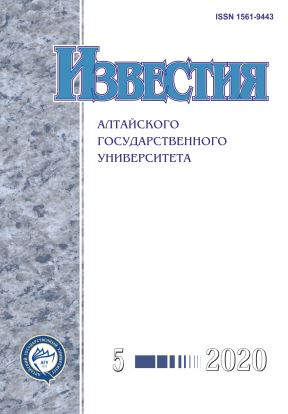On the Problems of Periodization and Features of the Russian Enlightenment
УДК 930.85 ББК 63.3(2)
Abstract
In connection with the concept of the "new Enlightenment" formulated in the recent anniversary report of the Club of Rome, the author of the article analyzes the phenomenon of the Enlightenment in Russia. The points of view of domestic and foreign researchers on the positive and negative aspects of the Enlightenment, the reasons for the crisis of the "classical" Enlightenment and the need for its renewal are considered. One of the most important problems of the European Enlightenment of the 18th century - the crisis of public morality. The enlighteners borrowed the norms and values of traditional morality from religious consciousness, but sought to combine them with the guidelines for the rationalization and secularization of society and man. In Russia, this trend also took place, but the Russian Enlightenment is characterized by a more expressed axiologism, an orientation towards the mutual complementarity of moral values, scientific knowledge and socio-political progress.
The author also refers to the discussion about the chronological framework of the Russian Enlightenment, highlighting its three stages: Christianization of Ancient Rus; Europeanization of the Russian Empire in the 18th century; the formation of an independent science, culture and philosophy since the 1830s. In addition, the article talks about the dialectical unity and struggle of cultural and civilizational paradigms in the Enlightenment of Russia. It is concluded that the Russian philosophy, created in the polemics of Slavophiles and Westernizers, realized Kant's idea of the essence of Enlightenment -the ability to use one's own mind.
Downloads
Metrics
References
Ахиезер А.С. Россия: Критика исторического опыта : в 3 т. М., 1991.
Кантор В.К. «Есть европейская держава». Россия: трудный путь к цивилизации. Историософские очерки. М., 1997.
Медушевский А.Н. Утверждение абсолютизма в России: Сравнительное историческое исследование. М., 1994.
Янов А.Л. Россия и Европа, 1462-1921 : в 3 кн. Кн. 2: Загадка николаевской России, 1825-1855. М., 2007.
Гиренок Ф.И. Пато-логия русского ума. Картография дословности. М., 1998.
Ильин Н.П. Трагедия русской философии. М., 2008.
Кожинов В.В. Грех и святость русской истории. М., 2006.
Корольков А.А. Русская духовная философия. Духовный смысл русской культуры. СПб., 2006.
Лотман Ю.М. Беседы о русской культуре: Быт и традиции русского дворянства (XVIII - начало XIX века). М., 2020.
Непомнящий В.С. Пушкин. Избранные работы 1960-х -1990-х гг. : в 2 т. М., 2001.
Хоружий С.С. Современные проблемы православного миросозерцания. М., 2002.
Холодный В.И. А.С. Хомяков и современность: Зарождение и перспектива соборной феноменологии. М., 2004.
Пустарнаков В.Ф. Еще раз о сущности философии русского Просвещения 1860-х гг. и впервые о его кризисе // История философии. 1999. № 4.
Пустарнаков В.Ф. Философия Просвещения в России и во Франции: опыт сравнительного анализа. М., 2002.
Перетятькин Г.Ф. Русское Просвещение и русская литература // Научные ведомости Белгородского гос. унта. Серия: Философия. Социология Право. 2018. Т. 43, №1. DOI: 10.18413/2075-4566-2018-43-1-62-73.
Днепрова Т.П. Консервативная и либеральная педагогические парадигмы в культурно-цивилизационной континуальной реальности // Образование и наука. 2008. №9 (57).
Хоркхаймер М., Адорно Т. Диалектика Просвещения. Философские фрагменты. М. ; СПб., 1997.
Ортега-и-Гассет Х. Миссия университета. Минск, 2005.
Кассирер Э. Философия Просвещения. М., 2004.
Come On! Капитализм, близорукость, население и разрушение планеты (из доклада Римского клуба). URL: http://nbiks-nt.ru/2019/09/16/come-on-kapitalizm-blizorukost-naselenie-i-razrushenie-planety/
Широкова М.А. Индивидуализм и толерантность как принципы политической этики либерализма // Сибирский философский журнал. 2018. Т. 16, № 3. DOI: 10.25205/2541-7517-2018-16-3-89-99.
Макинтайр А. После добродетели: Исследования теории морали. М., 2000.
Широкова М.А. Проблема оценки периода 30-х гг. XIX в. в истории формирования русского национального самосознания // Известия Алтайского гос. ун-та. Исторические науки и археология. 2018. №5 (103). DOI: 10.14258/ izvasu(2018)5-15.
Широкова М.А. Концепция славянофилов как исторически первое философское выражение «русской идеи» // Евразийская интеграция: истоки, проблемы, перспективы: коллективная монография. Т. 1. СПб., 2017.
Герцен А.И. Московский панславизм и русский европеизм // Герцен А.И. Избранные философские произведения. Т. 1. М., 1948.
Пушкин А.С. О ничтожестве литературы русской // Пушкин А.С. Собрание сочинений : в 10 т. Т. 6. Критика и публицистика. М., 1962.
Кант И. Ответ на вопрос: Что такое просвещение? URL: http://www.bim-bad.ru/biblioteka/article_full.php?aid=344.
Веневитинов Д.В. Несколько мыслей в план журнала // Веневитинов Д.В. Стихотворения. Проза. М., 1980. URL: http://az.lib.ru/w/wenewitinow_d_w/text_0090-1.shtml
Аксаков К.С., Аксаков И.С. Литературная критика. М., 1981.
Izvestiya of Altai State University is a golden publisher, as we allow self-archiving, but most importantly we are fully transparent about your rights.
Authors may present and discuss their findings ahead of publication: at biological or scientific conferences, on preprint servers, in public databases, and in blogs, wikis, tweets, and other informal communication channels.
Izvestiya of Altai State University allows authors to deposit manuscripts (currently under review or those for intended submission to Izvestiya of Altai State University) in non-commercial, pre-print servers such as ArXiv.
Authors who publish with this journal agree to the following terms:
- Authors retain copyright and grant the journal right of first publication with the work simultaneously licensed under a Creative Commons Attribution License (CC BY 4.0) that allows others to share the work with an acknowledgement of the work's authorship and initial publication in this journal.
- Authors are able to enter into separate, additional contractual arrangements for the non-exclusive distribution of the journal's published version of the work (e.g., post it to an institutional repository or publish it in a book), with an acknowledgement of its initial publication in this journal.
- Authors are permitted and encouraged to post their work online (e.g., in institutional repositories or on their website) prior to and during the submission process, as it can lead to productive exchanges, as well as earlier and greater citation of published work (See The Effect of Open Access).








